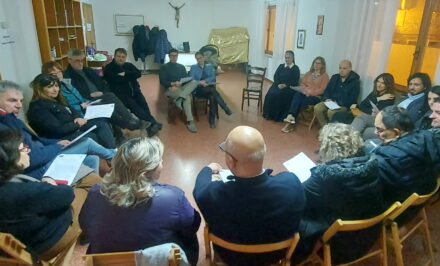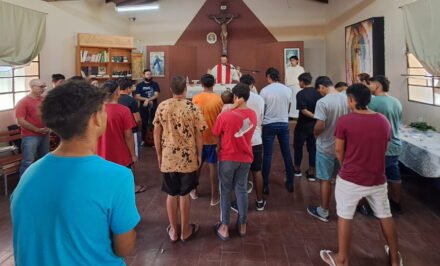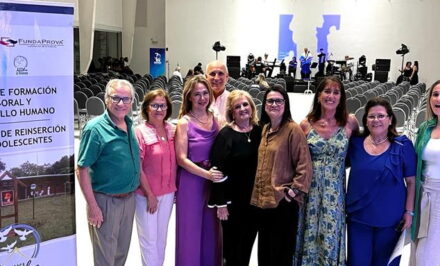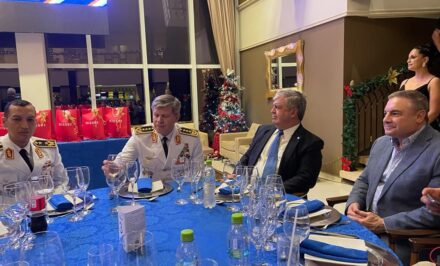GERMANY, fma. “Keep going – even when the going is tough” – the subject for the Jour Fixe for Business People and Leaders in the Economy – hit the nail on the head this Saturday, 22 November, quite literally while preparing the hall, because it was almost impossible to add more chairs to the circle, and yet the next announcement was: Someone else has suscribed! The suspicion of those responsible for the International Kentenich Academy for Leaders, who were conducting the Jour Fixe, was confirmed: It’s the turn for this subject – how to deal with pressure; experiences with ever increasing restrictions on creativity, and specifications for time and performance that seem to leave hardly any room for creativity and personal interest in staff and colleagues. It not only worries business people personally, but many others as well. The keynote address of Christine and Erwin Hinterberger immediately gave rise to a wave of relaxation that unleashed forces: Let us tell each other about a successful experience last week …

A car drove up the mountain. Of the four occupants, only one wanted to attend the Jour Fixe. What it exactly meant she didn’t know, but she had been invited by her parents and thought it could be something for her husband. Their two daughters in the car didn’t want to be there and wanted to go home immediately, her husband also didn’t want to be there and didn’t know why he had come along. They parked their car next to another participant. Little Emilia R immediately approached the two girls and welcomed them – and that was the last time anyone saw or heard from them until their parents were the last to leave some hours later with the grateful and determined words, “Till next time”.
Forty successes in that week
 “That I got through this week quite normally” – that was the first success that brought the forty participants to relax and laugh, “me too”. Then one success after the other followed: A participant had planned to use a YouTube Video, but there was no internet where the event took place (yes, it’s still possible!). The DVD that had been ordered didn’t arrive. And a trainee, who had heard about it in passing, knew how to download YouTube Videos and show them offline. … A double booking by a scaffolding company could somehow still be met; a telephone call taken after office hours was able to prevent a delivery being returned; in a “minefield” it was possible to delimit spheres of responsibility; and despite documents being stolen someone was able to take a return flight from Barcelona to Munich … A couple who together run a pharmacy reported “After an endless search we were finally able to find a pharmacist we could employ and who could relieve us”; a long overdue interview took place, and the repeatedly discussed dismissal of a staff member, whose behaviour greatly disturbed the business, was “solved” when he gave notice … All those present, who had come to talk about strategies for “keeping going even when the going is tough”, were somehow buoyed up and relieved.
“That I got through this week quite normally” – that was the first success that brought the forty participants to relax and laugh, “me too”. Then one success after the other followed: A participant had planned to use a YouTube Video, but there was no internet where the event took place (yes, it’s still possible!). The DVD that had been ordered didn’t arrive. And a trainee, who had heard about it in passing, knew how to download YouTube Videos and show them offline. … A double booking by a scaffolding company could somehow still be met; a telephone call taken after office hours was able to prevent a delivery being returned; in a “minefield” it was possible to delimit spheres of responsibility; and despite documents being stolen someone was able to take a return flight from Barcelona to Munich … A couple who together run a pharmacy reported “After an endless search we were finally able to find a pharmacist we could employ and who could relieve us”; a long overdue interview took place, and the repeatedly discussed dismissal of a staff member, whose behaviour greatly disturbed the business, was “solved” when he gave notice … All those present, who had come to talk about strategies for “keeping going even when the going is tough”, were somehow buoyed up and relieved.
Clarity, strength, austerity, dignity

Melanie and Ulrich Grauert followed up with a large number of authentic experiences of times of great pressure. Their first message was that when pressure builds, clarity is lost; we suddenly move in a fog and can no longer keep a vision in view that will give us the strength to go on. Clarity for myself and clarity for others sets us free. Whoever constantly feels cornered becomes anxious, and that paralyses. It is sufficient to see the next step clearly.
Where do we get the strength? The speakers were able to take up the experience of the group with the successes of the week: Joy is the source of strength. To prove this they quoted the example of a leader who asked the question “And what is the good news of the day?” so persistently that in the meantime it has become part of the culture of that business. Or the sailing trip of some managers of a business who took a day off together because time was so scarce and the pressure so great that they had lost the feeling of togetherness – actually their greatest strength. That it works is shown by the answer of a prisoner who was with Fr Kentenich in the concentration camp at Dachau. He was asked how they had coped with the horrors of their situation. He said, “When we were together, we often told jokes and laughed a lot.” One of the participants took this up during a conversation that took place later. “We brothers and sisters sat together at home and waited for a call from the hospital. Our Dad was very ill, but the doctors had sent us home. We sat there in silence, tense and sad. Then my youngest brother said, ‘I’m going to fetch the cards and we will play a game!’ Dad had always loved that! Next morning our Dad died and we were all there – after a night in which we had laughed together as we had not done for ages, and during which we had talked about our Dad”.
Sometimes, the speakers pointed out, we also need austerity. Fr Kentenich did not risk his life in Dachau for trifles and whims – and we don’t need to risk our jobs on that account either. It is not a case of becoming hard, but of becoming rugged. Ruggedness could also include being able to distinguish between actual facts and possible bad news.
Then a deeper look at the danger of staff members or ourselves becoming bitter when our inner dignity is violated, either as a result of human weakness, or also through genuine injustice. What matters is to distinguish between a person and their actions. We can condemn the actions of a person, but can we still accept the person? Precisely when personal attachment exists, the danger is great that we are hurt and that this hurt goes deep.
Go through closed doors
 Melanie and Ulrich Grauert pointed to our covenant with God that ultimately upholds us – and bursts through what confines us.
Melanie and Ulrich Grauert pointed to our covenant with God that ultimately upholds us – and bursts through what confines us.
As the participants laughed, the couple talked about a guest who arrived late in the evening and was unable to find the key that had been placed outside for them. After spending ten minutes at the front door, three options remained for them: To sleep in the car – it was too cold. To get the people out of bed – they didn’t want to do that. Nothing else remained than to do what Jesus did and walk through the closed door. That worked – the door was unlocked.
Original: German. Translation from German: M. Cole, Manchester, UK














